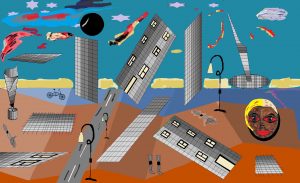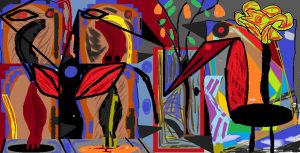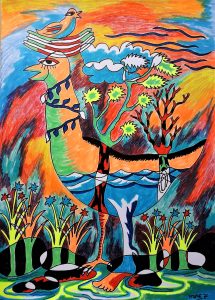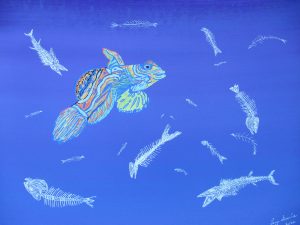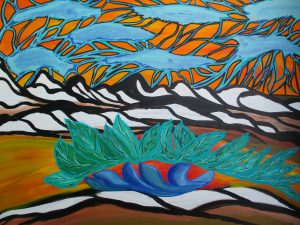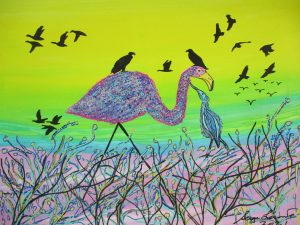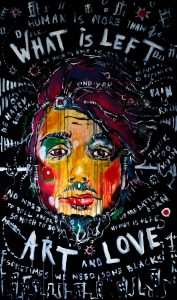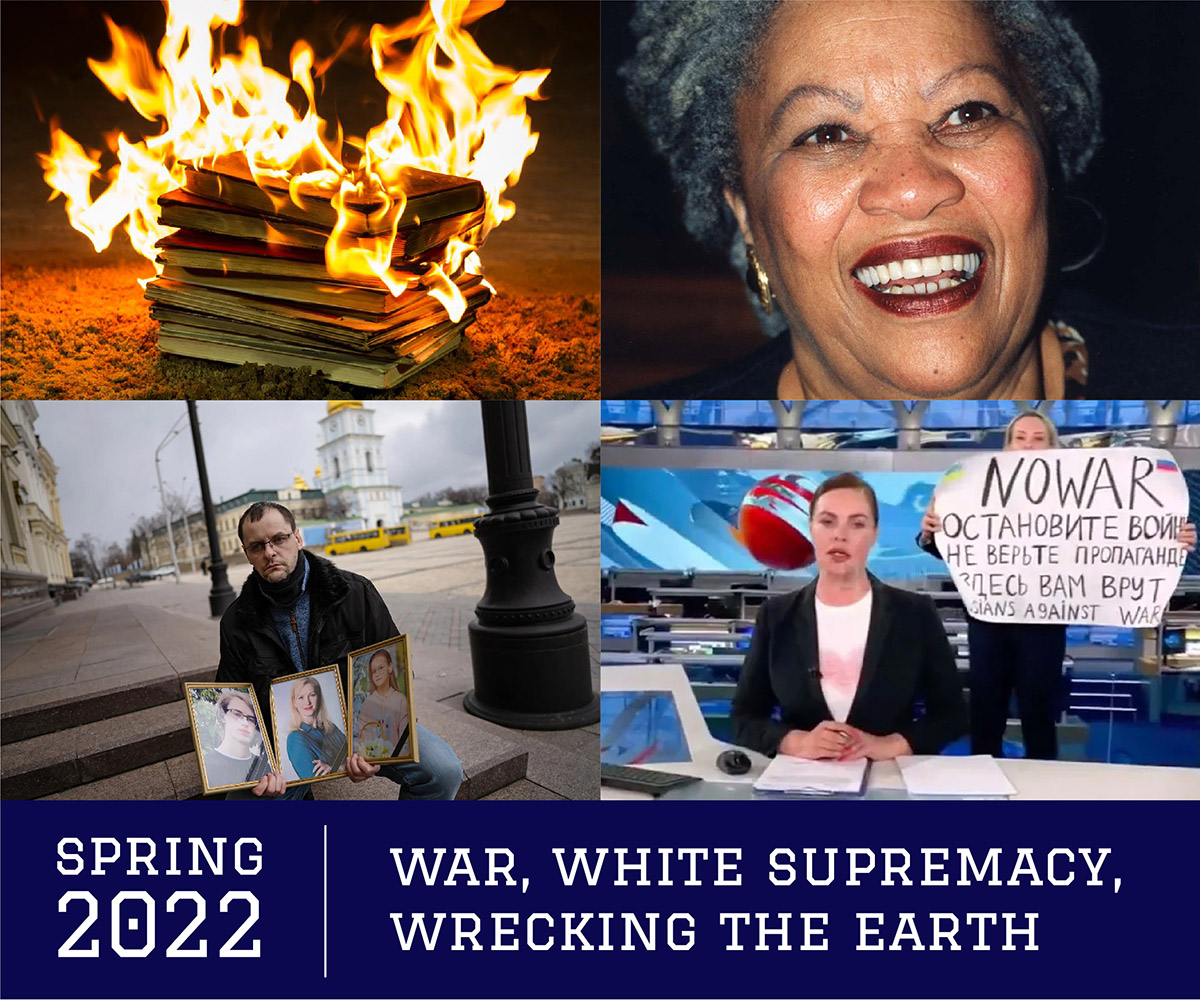
| From the current Issue Editor for Navigations: A Place for Peace – About Place Journal
We are in the process of bringing you a glorious edition of About Place Journal. In the meantime, we are thrilled to bring you these timely and meaningful global art, poetry and prose works from some global contributors to this season’s Black Earth Institute’s blog offerings to run alongside the new issue in-press, now featuring Roxanne Dunbar Ortiz, from the U.S. within these world works. Come celebrate this season’s offerings with us! Read on! Much love, Allison Adelle Hedge Coke |
|
Triangulation
Laura M. Furlan
Elvis Presley and White Nationalists
Roxanne Dunbar-Ortiz
Home
Shanna Niroumand-zadeh
War-Torn
Emmanuel Juma
Exit
Rizwan Akhtar
My Time has Passed
Oisín Breen
HOME
THE STORY OF FIN
Ipung Purnomo
Walking Memory
Abuchi Onyema
I am the Azurrection and the Leaf
Dendrogrammatikos/Treeverse
Com-menting with Chlorophytum comosum in Cthulucene
Lucie Chou
Not Yet I’m Still Dancing
Shrimp Migration Over The Taklamakan Desert
Tallest Flamingo in the World
Serge Lecomte
We Are Here
Tomislav Šilipetar
The maps appear to be arbitrarily placed on the wall, when in fact, the randomness required great planning. The draw of lines and symmetry are stronger than chaos. We hang street maps and state maps from mid-century road atlases. Historic maps, maps cut from books. A map of the World’s Expo in Chicago hangs next to a map of Indian Territory. We found them in bookstores, bought them on ebay. They are monochrome. Or pink or yellow or green. Some have fold lines and are worn. A map of California is printed on a page from an old dictionary, so a hot-air balloon appears to float above the central coast. We can point and say, We have been here. This is where we lived. And here. And here.
I have always been drawn to maps—for the beauty of their lines, the curves of rivers, the accomplishment of cartography. The desire to know a place. I imagine vast expanses of territory and their layers of history. Our sons will grow up with maps, these places on paper, and learn that there is order to the chaos of movement. We have so much to teach them about distance and direction, plats and relief, coordinates and triangulation, ancestral land, the collecting of maps.
Elvis Presley and White Nationalists
Roxanne Dunbar-Ortiz
I first noticed it in 1973, when I was working at Harrah’s Tahoe, the populist casino that bussed in hundreds of white working class people from the California Central Valley and Sacramento valley towns to spend twelve hours playing the nickel slots, then bussing them back home–free, good clean fun, except they usually left rent money or mortgage payments behind.
I worked first as a slots change “girl” on the floor, elbow to elbow, shoulder to shoulder, breath to breath, with these people. They were familiar to me as my own relatives from having grown up in rural Oklahoma, many of them descendants of the Dust Bowl Okies or the “defense” Okies, those who migrated to work in defense plants along the Pacific coast during World War II. Most of these sojourners were in their thirties and forties back in the early 1970s. I was thirty-three myself at the time and a Sixties’ veteran of a decade of civil rights, anti-war, anti-racist, and feminist movements, burned out in the lovely Lake Tahoe basin, trying to write a book before descending back to urban reality and re-assuming my rebel stance. But, I had to work a forty-hour week, punch a time clock, to subsist. I didn’t get much writing done, drinking with my co-workers after the graveyard shift.
Promoted to a change booth in slots, I sat all alone on my perch with a bird’s eye vision of the slots section and nearly the entire casino floor. There were shows all night in the casino, some of them without charge, such as Fats Domino frequently performing in one of the bar areas for the price of a drink. Others took place in the big show rooms, but were not expensive, at least not at Harrah’s. I saw Sonny and Cher, Raquel Welch with her living puppet show–living because the “puppets” were living dwarfs–and there was the hulking figure of Merle Haggard many nights, at a Blackjack table, playing alone against the dealer.
A bloated, nearly dead, has-been Elvis Presley–he died four years later at forty-three–was another. Elvis had been my king sixteen years earlier when I was a senior in high school, 1955-56. I had moved from the country to Oklahoma City to live with my sister that school year, working nearly full time and finish high school at a trade school. Volunteering as an usher at the Municipal Auditorium, I was able to get in free to see Elvis perform in person. On other occasions at the Oklahoma City Municipal Auditorium, I volunteered as an usher and saw Bo Diddley, Fats Domino, Little Richard, Ruth Brown, Chuck Berry, and other favorites of us “wild” teenagers–it was also the year of “Rebel Without a Cause” and “Blackboard Jungle.” This music shook up my presumptions, well-honed by my Southern Baptist upbringing, and opened doors of my mind. The music, and my admiration for the Black artists, coincided with Civil Rights demonstrations in Oklahoma City–I was attending the first integrated high school in its first year of integration–and had to do with making me supportive of that growing movement.
Poet and songwriter, John Trudell, called Elvis our “Baby-Boom Ché,” in his wonderful 1992 song:
You wanna know what happened to Elvis?
I’ll tell ya what happened.
I oughta know, man, I was one of his army.
I mean, man, I was on his side,
He made us feel all right.
We were the first wave in the post war baby boom.
The generation before had just come out of the great depression
and World War Two,
You know, heavy vibes for people to wear,
So much heaviness
Like some kind of voiding of the emotions.
Their music,
You know, the songs life always carries.
You know, every culture has songs?
Well, anyway, their music was restrained emotion,
You know, like you didn’t wanna dance
If you didn’t know how,
Which says something strange.
Well, anyway, Elvis came along about ten years after the nuke
When the only generals America had and the only army she had
Were Ike and Mac
And stupor hung over the land,
A plague where everyone tried to materially free themselves,
Still too shell-shocked to understand
To feel what was happening.
The first wave rebelled,
I mean, we danced even if we didn’t know how,
I mean Elvis made us move.
Instead of standing mute he raised our voice
And when we heard ourselves something was changing,
You know, like for the first time we made a collective decision
About choices.
America hurriedly made Pat Boone a general
In the army they wanted us to join
But most of us held fast to Elvis and the commandants around him
Chuck Berry, Buddy Holly,
Little Richard, Bo Diddley, Gene Vincent,
You know, like a different Civil War all over again
I mean, you take ‘Don’t Be Cruel’, ‘I Want You I Need You I Love You’ And ‘Jailhouse Rock’,
Or you take Pat and his white bucks singing love letters in the sand,
Hell, man, what’s real here?
I mean, Pat at the beach in his white bucks,
His ears getting sunburned,
Told us something about old wave delusion.
Then before long Elvis got assassinated in all the fame,
Taking a long time to die.
Others seized control while Elvis rode the needle out
Never understanding what he done.
It’s like we were the baby boom because life needed a fresher start,
I mean, two world wars in a row is really crazy man
And Elvis, even though he didn’t know he said it, He showed it to us anyway
And even though we didn’t know we heard it,
We heard it anyway
Man, like he woke us up
And now they’re trying to put us back to sleep.
So we’ll see how it goes,
Anyway, look at the record, man,
Rock ’n’ roll is based on revolutions
Going way past 331⁄3
You gotta understand, man,
He was America’s baby Boom Ché.
I oughta know man,
I was in his army.
By 1973, most of us who had been in Elvis’s metaphorical army thought Elvis was an embarrassment and a tragedy. The other Rhythm and Blues/Rock and Roll artists from the 1950s–the Black artists, were still revered, but not Elvis. I assumed my attitude was universal, but I saw with my own eyes how Elvis packed them into the Nevada casinos during the 1970s in his second career. Judging from his fans that I observed, members of the new generation were not among them, rather those who would have been teens like me or a few years older in the early and mid 1950s when he burst on the scene. Then I realized that many of my own cousins and friends from that time who had scorned Elvis were now enthusiastic fans. I was the single only individual from my poor, rural extended family and friends, mostly Southern Baptists, to become a rock and roller and later a blazing leftist radical.
One night, sitting in my change booth on high, nearly thinking through the din of the thunking one-armed bandits and jackpot alarms, it hit me: These fans of the second-act Elvis had been the “squares,” as we called them in the 50s, the good little Baptists who thought Elvis was vulgar sexually, and that we who adored him were sinners headed for hell. They were now living what they had missed and must have envied desperately when they were teens. Now it was safe, but still fun.
A similar revelation came to me as I witnessed the participants in the Tea Party rallies against Obama, ballooning into Trump’s stadium events. They are the same people grown older, plus later baby-boomers who missed the Sixties fun of mass rebellion, mostly from rural or small towns or working class white suburbs. They were the ones drafted into the Vietnam War or went to business school or trade school, rather than Berkeley or Harvard. They were the ones who raised children in their evangelical and fundamentalist Protestant faiths. They are who I was supposed to turn out to be, except for a “simple twist of fate,” or maybe Elvis’s gyrating hips. They are doing a parody of the Sixties that they missed.
“Go back to where you came from! they scream –”
spit frothing at the corner of angry mouths,
You don’t belong here they seethe
unable to comprehend the sheer nerve of my presence in such spaces.
but where am I to go, when this has been my home since the tender age of six?
when all I’ve known has been the “melting pot” that has been the United states.
does my olive skin somehow stop me from seeing the injustices so blatantly done?
does the language of my mother’s tongue take away from the sting of Islamophobic slurs hurled my
way- simply for daring to survive on colonial land?
I seek redemption for my brothers and sisters alike
Justice for the common good of our communities,
for the common good of the state of our nation,
for the common good or the battle within our souls.
will we cast out “the other”?
or finally recognize that hatred spewed
is only inner anguish, finding new light.
I still hear the drumbeats from the soldiers
They are quickly accelerating the beats
I had thought that all was settled
When blue-capped soldiers arrived
They all came from stronger and stable nations than us
To try and bring peace
Peace has been naughty since the beginning
Everyone has been searching for peace
They tried at the peaks of mountains,
Under the smooth stones of the river,
Inside our smoky huts,
In the deep forests,
But peace has never been found.
Peace scampered away early in the morning
It was roaming all over the land with ease
Not until one man decided to kill another in the market
He sank two bullets in his chest after a duel
The tension grew hotter and fiercer enough to break peace
The shooter was Northern and the latter was Southern
That is how hell broke loose.
Everybody started a war; war without end
Children and women have died like poisoned rats
Our leaders are scrambling for the goodies left
The soldiers are tearing our fields with greed
We are in homeless shelters without food
There is no light since our peace was stolen.
sadness deracinates from
sandy coasts to wet groves
sees the jet tearing clouds
set to take a monumental
landing on a solid strip
nations’ egos engraved
on the tails of aero planes
lined up like guests waiting
another refill another taxing
no reprieve either for cargoes
and children scampering on
floors small bags fixed on
backs our generations to
fly over for jobs jettisoned
on shores now in isles of
rattling trolleys, a smiling
homeless hostess knowing
the flight is turbulent and
maps yawn in-between
you are a lonely baggage.
My Time has Passed
Oisín Breen
There is a verse that is incumbent on us to repeat:
Of blessed hunger,
And enduring until we die.
But I long for a caress,
Softly indulgent,
And yet without measure,
A kiss shared at Dromahair Bridge.
But it is beyond me,
And it is winter now,
And you, the young, must leave the old bereft.
For ours is a rapture of russet,
Of left-behind apricot seeds,
A litany of gyres, levers and warning signs.
And so it is that the levee skirls with white noise and elan.
For here in the dark light, where prohibition becomes licence,
Here there is death: the one true vision of abundance.
And so I keep traces of lost names in the gabble of the yarrow stalk –
In hexagrams –
So as to lay down the power of them,
To cut the words of them in eight parts for the memory of the wooing of my love,
To venerate them, and the shame of their cold-blood,
To salute the traces of scarlet on their breasts.
And well I remember when I first saw her,
Bright silver she was,
Hair like a blooming iris,
A beautiful painted corpse.
THE STORY OF FIN
Ipung Purnomo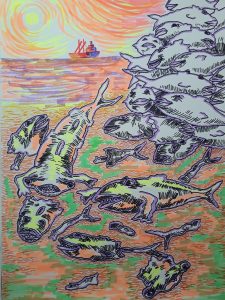
Tons of memorable years
Has gone with passage of time.
Many green leaves from the beautiful
Trees have gone dried and died off
As change continues to humble nature.
Life in her bank of unlimited knowledge
Has taught me good, the bad and the ugly
Now I live with a walking memory
Of my fellow comrades who I lost
Fighting death to stay alive till death O’clock
Things has fallen apart. things have changed
Before now this land a Canaan land
A garden of peace and heavenly mannas
Product of good leaders and thinkers
But time has killed them with corruption
The older I get, the more friends I lost
My husband and I have raised grandparents
I’ve served humanity with utmost good faith
I pray the next generation elect good leaders
That governs not our state alone, but the world at large.
Till the end of time…
I am the Azurrection and the Leaf
Lucie Chou
Heard at the vegetal time of darkblue dawning. There are so many plants inside me
My womb hides a blue translucent wood.
All my mosses and lichens, Ferns and flowers, trees, Tremble in a deep well of water.
Their breaths are silent, not quiescent. I sense their worried susurrus.
I go to them in sleep.
There I become padded into pleated petals.
I have a worm brain and swim home
To the sachet and seal of a furled sapphire flower.
There I drown into ancient afterlife As an embryonic arboreal dolphin Delving in and out of delphiniums.
Into my dream pollen murmurs the tale Of the first floating blue leaf.
How it began to breathe.
My womb is withered. Weak red wreaths. Blue are bacteria. Blue is mold. Bluets. Blue flax. The bluegreen bat vine.
The blue matrix of green memory Is not made up by, but maketh me.
I wish to heal my blue mater’s grief.
Life’s liquid lapis lazuli. The Azurrection. The Leaf.
I live inside worlds of so many plants That grieve.
Learn to live those griefs.
Dendrogrammatikos/Treeverse
Lucie Chou
Is what one must con And be versed in
To be in conversation With dendros/trees. Learn every turn
Of each letter in Treescripture. Comprehend trees common grammar. Trees vegevolta.
Trees communiverse.
When trees shed shorn of leaf
Do they write sans serif?
Does the vernal verse attach
Verdant tassels of new tagmemes?
Is every lushlovely motion of Life
An outriding foot, a loudblooming Leitmotif?
Do distinct species differ as signifying systems Or oddly fanciful fonts like Bodoni Ornaments? What about scribophobic surfaces?
Soiled soils? Murky firmaments?
Do they eradicate erudite elements, Expurgate filaments persnicketily penned? Do birch trees write on birchbarks ?
Write upon white bark dark marks?
Do buche trees write buchs
On their beechgrey bulwarks?
Do trees write
In oakgalls or with woodpens ?
That’s O difficult but
Wood of each tree thinks and
Those thinkings are their inks.
Trees write dendrograms.
Subtle grace.Grammatical grains.
Trees write hirsute herringbones Trees write shy hyphens
Trees write aspiring apostrophes Trees write stretchy esses
Trees write YYYYYYYYYYYY
Trees write atroflagrant A’s
Trees write with zigzagging elbows
Trees write fissuring signs of integrals
Trees write aitches to reach into air to mean heavenhair Trees write cirrous C’s
Trees write veggewobbling W’s
Trees write aggregates of acuneate asterisks to articulate acute aperçus Trees write PPPPPPPPPP but don’t mean park nor pee
Trees write triffid letters but they’re no obituary of tulip trees
Trees write très-trenchant T’s to transpierce a piece
Trees write Janus-faced J’s upside down
Trees write capital gammas but don’t mean gallows
Trees write F’s
Trees write f’s
(These forms are diFferent))
Trees write infinity signs propped like popsicles
Perfected by winter into icicled twinned quidditch loops Trees write languages of Hyperboreal Groups
Trees write tier after tapering tier of tildes to tessellate towers Trees write cursive l’s to cut roots curlysnarl
Trees write k’s in lowercase to crack and kick clods
Trees write wee e’s at the end of their repetend
Eloquent e’s
At explosive edges of every tree
Everytree everytree everytree
Tree tree tree
Tree tree tree
Tree tree tree
Is dendrogrammolalia A pareidolia?
See that tree Ensemplastic of eternities
Eke
Each and every tree Scribes
In photosentient lines Its sacred Treeditional Kabbalah
Its simple
Infinite
Enigma
Tree
Tree tree tree Tree tree tree Tree
Com-menting with Chlorophytum comosum in Cthulucene
Lucie Chou
in homage to Donna J. Haraway
will you play SF with me, green plant of luxuriant locks? (beautiful hair appurtenant to no head;
your hair becomes your hands become your headless mind[s]) you are verdant and hirsute, holding forth strong, spidery, full-arched branches, whose extremities
are both hair-hands and that with which they entrust
what is held out to. I see in this palpy outreach
of yours, spider plant fairy, a sagacious flourishing
of hope, hospitality, history, of holding your hairy lives
hostage to happenstantial love, of always
holding open all those helping hands to Earth,
of bravely bracketing all those young plantlets
of tufted ribbony leaves and fleshy aerial roots
to fabulate life’s green hairy stringy routes.
Chlorophytum comosum, Green Plant of Ample Hair,
will you create SF with me? where SF stands for
string figures, species friendship, synnoiac flourishing;
Hairy Spider Fairy of the Green Plants, if you will,
Trailing from pots on my windowsill,
cut me one handful of your locks to carry,
with both my humble human hands,
with lively loving curious care,
cat’s-cradle-wise, not to keep but to relay,
but to lay out to land, to save by setting free,
setting in humus, fostering with hot compost,
to sow the future for spider fairy fecundity
that synthesizes photons for sympoietic felicity.
Not Yet I’m Still Dancing
Serge Lecomte
Shrimp Migration Over The Taklamakan Desert
Serge Lecomte
Tallest Flamingo in the World
Serge Lecomte
We Are Here
Tomislav Šilipetar
dN eQ graduated from Armenian State University of Economics and got a bachelor’s degree in commerce. They were always interested art. After graduating from the institute, they decided to work in their specialty. Some time later, they realized it was not for them and began to draw. They are self-taught.
*
Laura M. Furlan teaches Native American literature at the University of Massachusetts. Her poetry and creative nonfiction have been published in Sentence, Jubilat, Yellow Medicine Review, and in the collection Sovereign Erotics. She is currently working on a memoir about motherhood and adoption. She lives in Northampton, Massachusetts, with her wife and two sons.
*
Roxanne Dunbar-Ortiz is a historian and author of 12 books, most recently, Not “A Nation of Immigrants”: Settler-Colonialism, White Supremacy, and a History of Erasure and Exclusion.
*
Shanna Niroumand-zadeh is a 29-year-old Iranian native who now resides in Sacramento, California. Her family migrated from Iran in 1999, and Shanna spent her formative years in the Bay Area – surrounded
by the idea that was the “American Dream”. The duality of culture and self-exploration central themes in her writing, going hand in hand with the political undertones of justice, empathy, and how to better our communities.
Shanna obtained her Bachelor of Science at CSUS and her Paralegal credentials at UC Davis, which she has used to work in nonprofit spaces dedicated to the betterment of society.
Currently, she is working on her first debut poetry collection to be released by self-publication in 2022, Gemini Moon.
*
Emmanuel Juma is a Kenyan poet. Besides poetry, he has authored several children books, novels, short stories and also motivational books. He also writes plays for schools and other organizations. His first published works include: Delusions of Addiction, Letting Go and Along the Way; all available in leading online bookstores. He is one of the contributors of The Hunger Anthology, published by Transcendent Press, USA. He is also a life coach and motivational speaker. He is currently a medical student at Chuka University.
*
Rizwan Akhtar’s debut collection of poems Lahore, I Am Coming (2017) is published by Punjab University Press. He has published poems in well-established poetry magazines of the UK, US, India, Canada, and New Zealand. He was a part of the workshop on poetry with Derek Walcott at the University of Essex in 2010.
*
A poet, part-time academic in narratological complexity, and financial journalist, Dublin born Oisín Breen‘s widely reviewed debut collection, Flowers, all sorts in blossom, figs, berries, and fruits, forgotten was released Mar. 2020.
Breen has been published widely in journals, including About Place, Door is a Jar, Northern Gravy, the Blue Nib, Books Ireland, the Seattle Star, Zvona i Nari, La Piccioletta Barca, the Bosphorus Review of Books, Reservoir Road, In Parentheses, the Madrigal, and Dreich magazine.
*
Ipung Purnomo is an Indonesian artist. He was born in 1974. He’s had passion for painting since he was very young. His early works were landscapes and portraits. He had his first solo painting exhibition when he was in a college. He lived in Yogyakarta from 2001-2005. He ran a painting studio there. He traveled to some cities in Indonesia to receive trainings from some professional artists.
Currently, he’s living in Kediri, East Java. He has participated in national and international exhibitions. A few collective exhibitions that were held in Indonesia and some collective exhibitions which were held in Japan, the USA, Italy, the Netherlands, Vietnam, Columbia, the UK, France, Poland, Germany, Spain, Rome, and Austria. His works have been included in international publications: International Contemporary Artists, International Contemporary Masters, and Inter-Asia Cultural Studies Journal. He has received a Museum Award from Musee de Peinture de Saint-Frajou, France. He wrote a book “The Artistic Glimpse Of The East”, published by The Scholar’s Press, which recently has been translated to eight languages: French, German, Dutch, Spanish, Portuguese, Italian, Russian and Polish. He was selected for an artist’s residency program at Kersan Art Foundation, Yogyakarta, in June 2019.
*
Abuchi Onyema is a writer and author of Within The Four Walls. He is from Anambra State, Nigeria. His works centered on nature, humanity and contemporary issues. His literature work has featured in many journals and websites including; SpillWords, League Of Poets, Nnoko Stories and more.
*
Lucie Chou is an ecopoet, naturalist and convivialist resident in China. She is a college freshman at Xian Jiaotong University and is constantly aspiring to give intelligible voices to differently articulate living beings in her poetry. Some of her human influences include Marianne Moore, Amy Clampitt, Peter Larkin, and Michael Marder, while nonhuman ones would encompass, among others, a sweet gean tree that grew as her nursery, and the pigeons, finches and sparrows that also call the tree their home. Her poetry has appeared in Entropy magazine in 2021.
*
Serge Lecomte was born in Belgium. He emigrated to Brooklyn in 1960. After graduating high school, he became a medic in the Air Force. He earned a Ph.D. from Vanderbilt University in Russian Literature, worked as a Green Beret language instructor, and received a B.A. in Spanish Literature from the University of Alaska where he taught from 1978-1997. He built houses, worked as a pipefitter, orderly, landscaper, driller, bartender. He is also a published poet, novelist, playwright, and artist.
*
Tomislav Šilipetar was born in Zagreb.
In 2014 he graduated from the Academy of Fine Arts in Zagreb in the class of Igor Rončević-Painting Department. In 2015 he becomes a member of HDLU. In addition to many group exhibitions, he had a number of solo exhibitions in Croatia as well as in the other countries. He is the winner of the rector’s award for excellence in 2013. The paintings are mostly made in acrylic, and the themes vary from solitude and isolation to the very existence of human existence in the society that condemns. It favors the simple colors, and the line that goes perfectly with the total preoccupation of getting out of the ‘boxes’ of academy.
In 2016 he gained the status of an independent artist.


